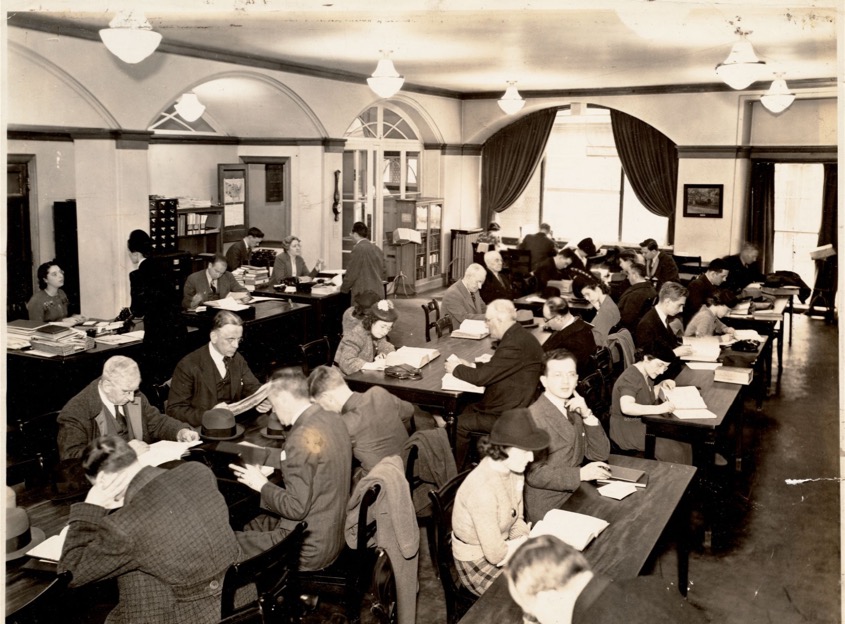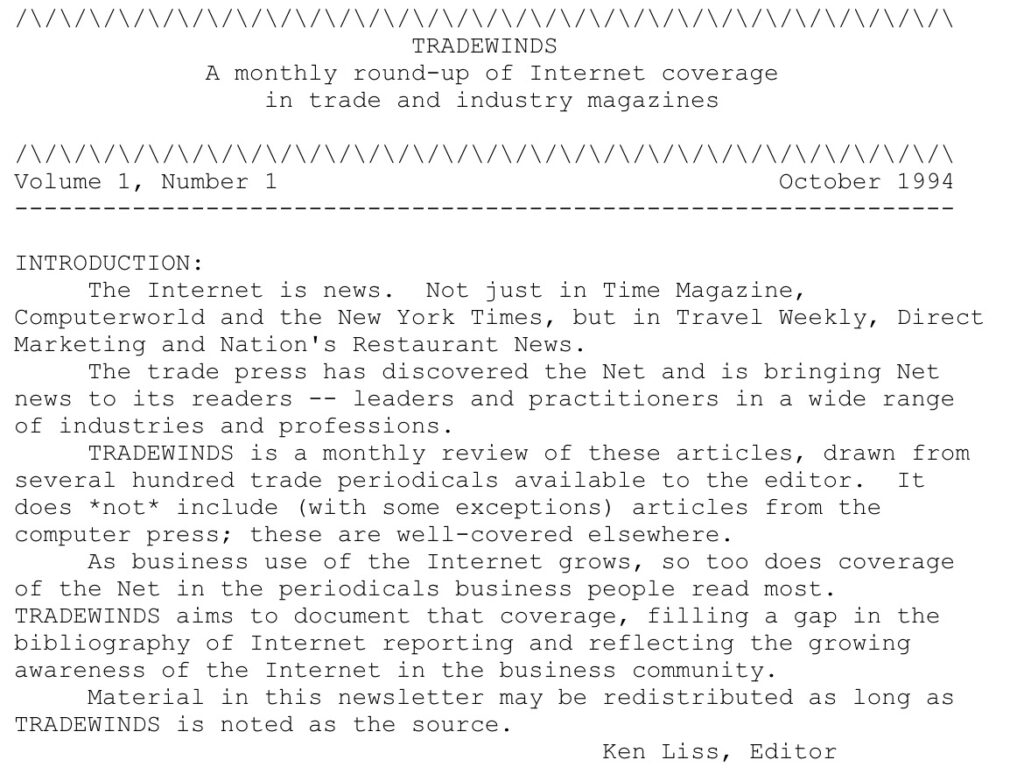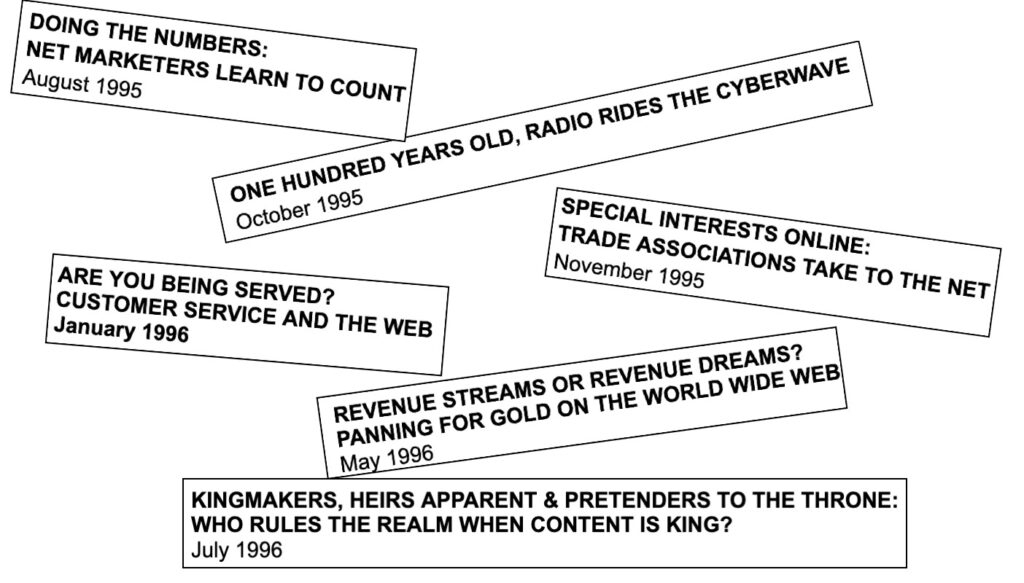In October 1993 I started working at the Kirstein Business Branch of the Boston Public Library, then located in downtown Boston. It was a busy place, filled every day with local business people, from CEOs to young people in their first jobs, as well as entrepreneurs, investors, job seekers, students, and the simply curious, all with business research needs .
Kirstein and its rich collection of resources were available to anyone who came through the doors of the three story building in the narrow alley where Kirstein had been since 1930. (The library is still around today, renamed the Kirstein Business Library and Innovation Center and located in a renovated space in the basement of the main library in Copley Square.)

One of my responsibilities was maintaining the hundreds of business and trade magazines on the third floor of the library. They ranged from broad, well-known magazines like Business Week, Forbes, Fortune, and Inc., to niche trade magazines and newspapers like Women’s Wear Daily, Travel Weekly, Supermarket News, Broadcasting & Cable, Modern Plastics, and many more.
Before long, I started noticing a growing number of articles about the internet, in the bigger, more general magazines at first, but increasingly in the niche publications as well. In October 1994 I launched a monthly publication, sharing and summarizing such articles.
I called it Tradewinds: A monthly round-up of Internet coverage in trade and industry magazines. It was emailed to subscribers – there was no cost – as a simple text file. The first three issues had just a brief introduction, followed by summaries of recent articles, organized by industry.


1995 brought changes, for me and for Tradewinds. In January I left Kirstein for a new job at Baker Library at the Harvard Business School. Tradewinds moved with me, published (beginning with the January issue) under the auspices of the library. By February, it was on the Web, though subscribers — I had about 500 –could still receive it via email.
In April, I started including essays, summarizing trends and patterns that emerged from my reading of the trade coverage of the internet. The first one looked at a new way of thinking, in the age of the internet, about the old adage that says the three most important things in real estate (or retail) are “location, location, and location.” In the online world, said a consultant quoted in the fashion industry publication DNR, “the word takes on a whole different meaning.”
Subsequent essays focused on trade press coverage of such topics as new approaches to customer service, revenue streams, trade associations, small business, broadcasting, and the impact of the web on the trade press itself.

The July 1996 issue of Tradewinds was the last one. I had too many other responsibilities, including building and managing the library’s first website. With two young kids at home, I couldn’t devote my spare time to the newsletter, and I let it die.
But the essays still live. They provide a window into what business people almost 30 years ago thought the internet was going to mean for them. It’s fun to see how differently it turned out.
- April 1995: A Place on the Net
Cyberspace may have blurred the traditional lines of geography, but when it comes to doing business on the Internet, location still has its place. - May 1995: Shootout at the OK Corral?
Is the Internet, as the media’s second most popular metaphor would have it, really akin to the Wild West? - June 1995: Going Digital: The Trade Press Gets Interactive
Trade magazines are going online, expanding their role as providers of business information and helping to shape developments in the evolving world of electronic commerce. - July 1995: Teaching Old Dogs New Tricks?
Despite all the talk of newness, it’s clear that many traditional business support functions and services will continue to have a role online, albeit in new and altered forms. - August 1995: Doing the Numbers; Net Marketers Learn to Count
Solid answers to questions about numeric and demographic data are not easy to find, but interest in them among online marketers is intense. - September 1995: E-mail, Listservs, Newsgroups & Gophers: Doing Net Business the Old-Fashioned Way
There’s little question that the Web is the future of business on the Internet. But where does that leave all of those who are on the Net, but not on the Web? - October 1995: One Hundred Years Old, Radio Rides the Cyberwave
100 years after Marconi’s invention of the radio, followers are looking ahead, innovating, experimenting and — perhaps — creating the future of the medium in the world of cyberspace. - November 1995: Special Interests Online: Trade Associations Take on the Net
The internet has presented new ways for trade associations to evolve, to communicate, and to interact with and on behalf of those they represent. - December 1995: The Great Equalizer?
On the Internet, to paraphrase a now-famous New Yorker cartoon, nobody knows you’re a small business. - January 1996: Are You Being Served? Customer Service and the Web
How well does the World Wide Web work as a customer service tool? - February 1996: The Trade Press and the Net: A Second Look
All of the key issues of Web development are there for trade magazines to contend with: issues of content, format, access, advertising, and fees, among others. - March 1996: The Naysayers’ Take on the Net
The trade press of late has had more than its share of columnists and commentators determined to knock the Web down a notch or two in the public imagination. - April 1996: Through the Looking Glass: Showing the Way to Cyperspace
For every company that’s already on the Net, there may be two or three more who plan to make the move. They may not know when or how — or even why — but they have seen the future and they intend to be there. - May 1996: Revenue Streams or Revenue Dreams? Panning for Gold on the World Wide Web
Articles in the trade press identify three basic money streams: advertising; subscription fees; and online sales. But no one is quite sure how to take best advantage of them or which streams can be counted on to bring in the profits. - June 1996: They Walk, They Talk, They Search the Web: Intelligent Agents of the Human Kind
Travel agents, realtors, insurance agents, stockbrokers, and others like them are looking warily over their shoulders at the Net, wondering whether their jobs will survive in the new electronic age. - July 1996: Kingmakers, Heirs Apparent, and Pretenders to the Throne: Who Rules the Realm When Content is King?
On the World Wide Web, content is king, or so the saying goes, even though the medium itself often gets more attention than the information it contains.